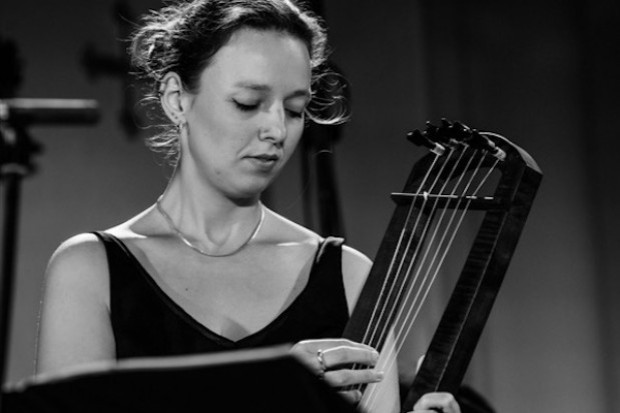
HIBERNIA & GERMANIA Medieval Songs of Irish Voyagers in Germanic Lands
A concert of medieval Latin song and chant with links to Irish culture in Germanic Lands by Jasmina Črnčič and Vlad Smishkewych (Ensemble Sequentia).
In the largely pre-literate society of the Middle Ages Irish missionaries—all of them true singers of tales—brought with them in their travels throughout Europe the power of the Word and the Voice. What songs did missionaries from Ireland sing and what songs survive which honour them? What kind of music accompanied these missionaries? What stories did they bring with them?
This specially-curated programme features songs about Irish travellers (mostly holy men) who were instrumental in bringing Christianity to much of continental Europe during the Hiberno-Scottish Mission (6th — 10th centuries). Spanning several centuries it includes music from the famous monastery of St. Gall (Switzerland) (St. Gall was a disciple of St. Columbanus, credited with founding many monasteries across continental Europe—and his feast day is celebrated on November 23rd.)
From the 12th century are works of Hildegard von Bingen who spent the first part of her life in the Benedictine monastery founded by St. Disibod another Irish missionary in Germanic lands and the third part of the programme consists of short highly-ornamented antiphons based on the Song of Songs. It is speculated that the manuscript in which these uniquely stunning little compositions are preserved originated either at the end of the 14th or even the beginning of the 15th century in one of the most important centres of the Hiberno-Scottish Mission St. Jakob in Regensburg, Germany. This abbey is popularly known in the English language as the Scots Monastery signalling the Gaelic origin of its founders. It functioned as the main point of departure for many daughter establishments some reaching even as far as Kyiv!
The concert closes with a lai or epic song telling the story of Noah and the Flood. This lai appears to have been quite popular in the 13th century because it survives with interesting melodic variations in several different manuscripts but the one version you will hear comes from a manuscript commonly referred to as the Dublin Troper compiled during the 14th century and represents one of Ireland’s most treasured pieces of material cultural heritage from the High Middle Ages.
The Slovenian mezzosoprano Jasmina Črnčič received a bachelors degree in classical singing pedagogy from the University of Music and Performing Arts Graz (Austria) in 2017. She continued her specialisation in medieval music and recently obtained a masters degree in medieval music performance from the Folkwang University of the Arts, Essen (Germany). As a member of the ensemble Carmina Slovenica she has performed in numerous staged and concert productions both as a part of the vocal ensemble as well as a soloist at many festivals and concert venues around the world (New York's Prototype Festival, Melbourne Festival, Operadagen Rotterdam, Radialsystem V Berlin, Holland Festival, Ruhrtriennale, and others). She is also a member of ensembles ¡Kebataola!, PER SONAT, and Magister Petrus which focus on the performance of medieval as well as contemporaneous music. Jasmina is currently a faculty member of the International Course on Medieval Music Performance of Besalú











